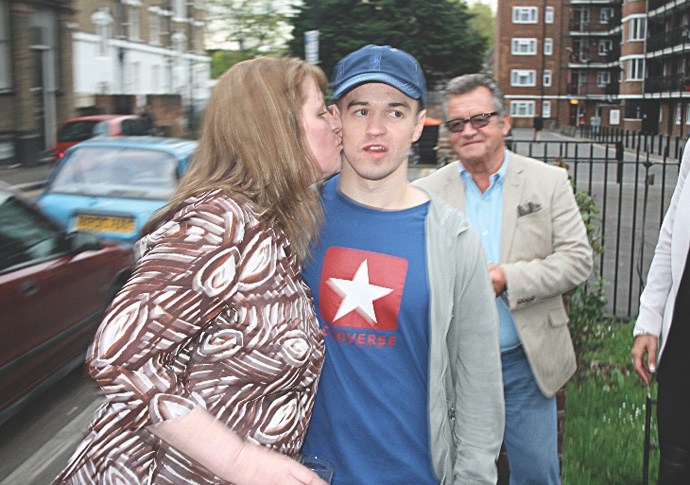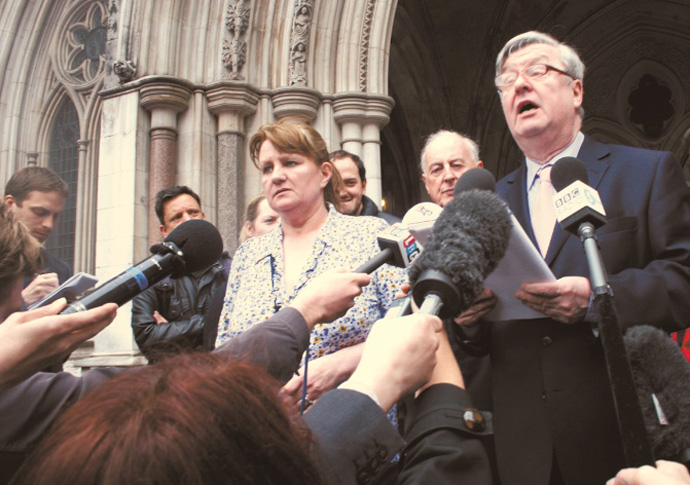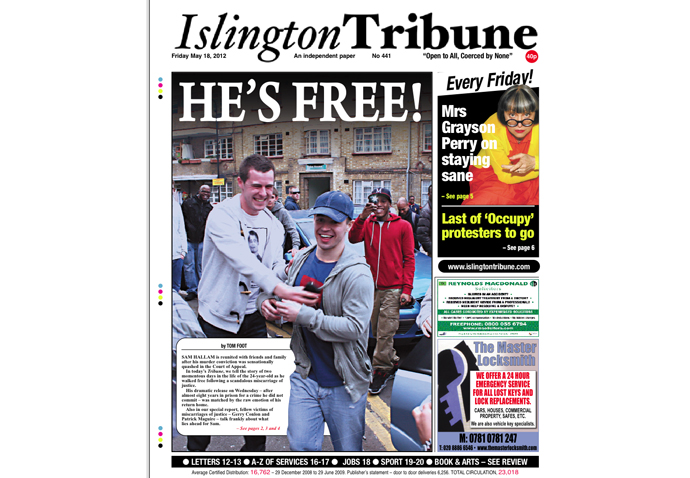No compensation for man locked up for seven years for a crime he didn't commit
After spending seven years locked up for a murder he did not commit, Sam Hallam’s conviction was finally quashed – and yet not a penny of compensation has been paid. This week there was another blow for a man who deserves more than a grudging apology
Friday, 14th June 2024 — By Tom Foot

Sam Hallam on the day he was released
A MISCARRIAGE of justice victim who was jailed for almost eight years for a murder he did not commit has called for the abolition of the government’s “brutal test” for compensation.
Sam Hallam, from the Arden estate in Hoxton, was speaking after a devastating judgment was handed down in European Court of Human Rights in Strasbourg on Tuesday.
He and his legal team attempted to overturn a system that has in the last eight years blocked 93 per cent of people whose convictions are quashed on appeal from being compensated.
It was the latest chapter in a long running scandal followed by The Tribune for two decades.
Mr Hallam, 37, said: “For 20 years, the whole of my young adult life, I have been fighting a murder case of which I am entirely innocent. Still today I have not received a single penny for the seven and half years I spent in prison. The brutal test for compensation introduced in 2014 needs to be abolished, it goes completely against what this country should stand for.”

Mr Hallam was freed from prison by the Court of Appeal in 2012 after fresh evidence emerged discrediting his conviction for the knife murder of Essayas Kassahun in Old Street in 2004.
Fourteen people came forward to say he wasn’t at the scene – including the intended victim of the stabbing, Louis Colley –while a mobile phone photo was discovered that backed up the legal arguments surrounding his alibi. The Met Police later issued an apology to Mr Hallam for its investigation.
But despite this he has not been able to meet the government’s bar for compensation that states convictions quashed on appeal must include a “new fact” that proves the individual’s innocence “beyond reasonable doubt”.
Critics say this effectively reverses a crucial pillar of the criminal justice system – that people are presumed innocent unless proven guilty.

Sam’s mother Wendy has been a tireless campaigner for her son’s freedom and is seen at the High Court in 2012
Although the European court’s “Grand Chamber” ruled that the test did not breach the European Convention on Human Rights, it stated that the UK’s test for miscarriage of justice compensation was “virtually insurmountable” – or more simply, almost impossible to meet.
Mr Hallam was sent to prison in 2005 aged 17 after being found guilty by a jury of the murder of a trainee chef Mr Kassahun the year before. The 21 year old was stabbed in Old Street as he tried to break up a fight, and later died from his injuries.
The Tribune has campaigned in support of Mr Hallam for almost 20 years, including visiting him in prison on his birthday along with his mother Wendy. There have been protests and art exhibitions while the Hollywood actor Ray Winstone, who was related to a friend of Sam’s, produced a television programme about the case on ITV.
A play, Someone to Blame, was put on at the King’s Head in Upper Street, Islington.
We were there the day he was freed by the Court of Appeal – to roars from the gallery – and an emotional party back on the Arden estate with his family and friends.
Despite the joyous scenes that day there has been a great personal toll for Mr Hallam that no financial payment could come close to making amends for. His father committed suicide when Sam was in prison and he has spoken about the struggles he has gone through with his mental health and holding down work.

The Tribune has followed Mr Hallam’s fight for justice and compensation for 20 years – coverage which included the ‘He’s Free!’ front page in 2012
Since the test for compensation was introduced, the Ministry of Justice has saved tens of million of pounds.
During the Parliamentary debate when the test was being brought in, Labour’s Baroness Helena Kennedy, speaking in the other place, told peers that to ask people to prove their innocence beyond reasonable doubt was “an affront to our system of law”.
The European court’s ruling follows an attempt by Mr Hallam and his lawyers to overturn the system in the Supreme Court in 2019.
Five of the 17 judges dissented against the European court’s ruling that said there had been no breach of Mr Hallam’s human rights.
The judgment said: “It could not be said that the refusal of compensation by the Justice Secretary imputed criminal guilt to the applicant by reflecting the opinion that he or she was guilty to the criminal standard of committing the criminal offence, thereby suggesting that the criminal proceedings should have been determined differently.
“To find in the negative that it could not be shown to the very high standard of proof of beyond reasonable doubt that an applicant did not commit an offence – by reference to a new or newly discovered fact or otherwise – is not tantamount to a positive finding that he or she did commit the offence.”
Lawyers at the Clerkenwll-based campaign charity Appeal have been involved in the case, arguing “we urgently need to find a mechanism to compensate those victims who have spent years in prison for crimes of which they are innocent, just as we need to compensate all the victims of the Post Office and infected blood scandals”.
Marcia Willis Stewart KC (Hon), Mr Hallam’s lawyer, added: “It cannot be right that in a just society there is no redress for years spent in custody. We will continue to bring pressure to bear on the government to amend the compensation scheme to enable Sam and others to obtain financial redress.”